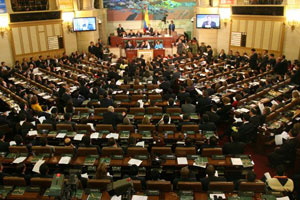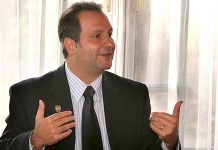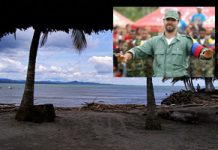The constitutional reform approved by Congress would allow several of those imprisoned for parapolitics to go free and cause certain cases to be voided and start from scratch.
 |
|
| The judicial reform approved by 172 congressmen could generate a deadlock in the process of parapolitics. Photo: Semana Archive. |
The judicial reform modified the way that politicians accused of links to paramilitarism would be investigated and judged. If the legislative act took effect (the Santos government has already objected to it), several former officials indicted for parapolitical scandals would be released from prison and the processes would slow for several years.
According to analysts and Supreme Court officials interviewed by VerdadAbierta.com, there are three contested points of the reform that could affect the parapolitical processes developed to date: the time required to implement a new system without a transition period, conflicts over the new distribution of functions and a possible accumulation of cases in the Supreme Court.
This being the case, if the reform takes effect, the almost three thousand cases against officials for links with paramilitaries and other crimes would congest the Supreme Court, sparking an institutional crisis and a causing setbacks in the legal action against parapolitics.
“The main problem is that a transition process does not exist between the old system and the new one established in the reform. For that reason, the nonexistence of a transition plan halts all cases while the new system is installed,” said former justice Augusto Ibáñez of the Penal Division of the Supreme Court.
The Changes
With the current model, congressmen and officials such as governors and ministers who are prosecuted for links with paramilitarism are investigated and judged in one instance by the Penal Division of the Supreme court.
In the cases which implicate officials such as governors, ministers and generals or admirals, the Attorney General investigates and the Supreme Court gives its judgment, dividing the process among the two institutions.
For both congressmen and other officials there only exists one instance of investigation and one trial, making the decisions of the Penal Division definitive.
With Article 16 of the reform, however, the process would change radically. Under the article, the functions currently completed by the Penal Division would be carried out by “a new Division of Investigation and Qualification consisting of six justices, three of whom would carry out thepreliminary investigation stage.” Later, the cases would pass to a second phase of investigation to be completed by the three remaining justices.
If investigators decide that the case should be tried, it would be sent to another division composed of five justices with the responsibility of convicting or acquitting the accused. In the new system, “the decisions of this division could be appealed in the second instance before the entire Supreme Court,” which would have the final word.
The new system, therefore, would not only eliminate the functions of the Penal Division of the Court, but would also double the instances of investigation and trial.
Confusions of the New System
The first problem, according to a Supreme Court official interviewed by VerdadAbierta.com, is that the government might take a month, or longer, to organize the process. “With the time it would take for the President and the new Judicial Administrative Division (which would replace the Judicial Council) to submit its candidates, combined with the time it would take the Constitutional Court to elect the justices that would make up the Investigation Division, the cases involving parapolitics could be delayed,” the official explained.
It is not clear who would be prosecuted under the new model. The reform stated that officials who have already been formally accused will continue under the old system, but did not specify what would happen with those in the preliminary stages of investigation.
Under the reform, then, former legislators such as César Pérez, who was found guilty in participating in the Segovia massacre and is currently awaiting sentencing, would be prosecuted by the Criminal Division of the Supreme Court. The cases of former senator Óscar Suárez Mira and former governor Hugo Aguilar, who have already been formally accused of maintaining links with paramilitaries, will also continue under the old system.
The majority of cases, however, which have not yet gone to trial, remain in limbo.
The Supreme Court currently has close to 100 pending cases that would fall into this legal vacuum, among them those of former congressmen Dilian Francisca Toro, Armando Benedetti, Juan Manuel Corzo and Julio Alberto Manzur.
According to Justice Ibáñez, if the institution in charge of investigation were to change, then some of the cases would have to start from scratch.
This would allow imprisoned former officials not yet formally accused to be released on the grounds of the invalidity of the process, as suggestedby former presidential secretary Bernardo Moreno, investigated for the Supreme Court “wiretap” scandal.
Upon learning of the approval of the reform, the High Court suspended Moreno´s case and denied his request for release.
For Armando Novoa, Director of the Center for Constitutional Studies, the new system will delay, prolong and in some cases annul the cases against former officials linked to parapolitics. “The reform is an amnesty through new procedures and divisions,” he said. “We are going to move from the image of the empty chair to the unoccupied bed in the hall of parapolitics.”
Congestion
Under the old system the Supreme Court was in charge of investigating congressmen, the Attorney General officials such as governors and the Committee on Accusation court justices. Under the reform, the responsibility of investigating all of these officials would fall entirely on the new Division of Investigation and Accusation of the Supreme Court.
According to the Supreme Court official interviewed by VerdadAbierta.com, the new division would become a bottleneck that would face a traffic jam of nearly three thousand cases stemming from different instances.
“If 1,500 cases come from the Attorney General against officials and from the Committee on Accusation another thousand, and those combine with those that the Supreme Court already has, each justice of the new division would have to take almost a thousand cases,” he said.
Setbacks in Legal Developments
Another problem in the new system is that all the knowledge of the Criminal Division of the Supreme Court regarding the investigation and sentencing of parapolitics would be lost.
According to Armando Novoa, the reform would harm the dynamic of the process, as the justices of the Criminal Division could only intervene in appeals before the full Supreme Court, which would include civil and labor contingencies.
Although the creation of a process for appeal can be understood as a guarantee for those who are accused, according to a Court official interviewed by VerdadAbierta.com, this system would have the fundamental problem of trying to reconcile the criteria for civil and labor justices with that of penal justices, who already have experience with parapolitics.
“Even though the appeal is based on the decision of a judge of the Penal Division, the process would undermine the very nature of this division that could now only occasionally intervene,” Justice Ibañez said.
For the moment, we can only wait to see what happens with the reform to learn of the effects on cases linked to parapolitics currently with the Supreme Court.











